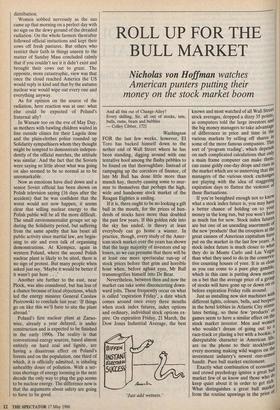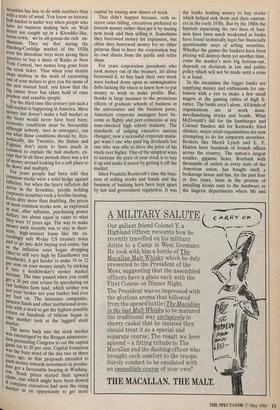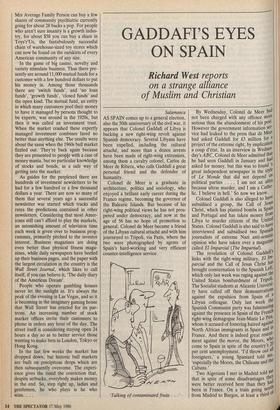ROLL UP FOR THE BULL MARKET
Nicholas von Hoffman watches
American punters putting their money on the stock market boom
And all this out of Change-Alley?
Every shilling, Sir, all out of stocks, tuts, bulls, rams, bears and bubbles — Colley Cibber, 1721
Washington FOR the last few weeks, however, El Toro has backed himself down to the nether end of Wall Street where he has been standing, digging around with one tentative hoof among the flashy pebbles to be found on that thoroughfare. Instead of rampaging up the corridors of finance, of late Mr Bull has done little more than munch hay, thereby causing some to mur- mur to themselves that perhaps the high, wide and handsome stock market of the Reagan Eighties is ending.
If it is, there ought to be no looking a gift bull in the mouth, for the prices of hun- dreds of stocks have more than doubled the past few years. If this golden ride into the sky has ended, in theory at least everybody can go home a winner. In practice, though, every study of the Amer- ican stock market over the years has shown that the large majority of investors end up losers, so we can presume that there will be at least one more spectacular run-up of stock prices before that grim and horrible hour when, before aghast eyes, Mr Bull transmogrifies himself into Dr Bear.
Nevertheless, between then and now the market can take some disconcerting down- ward jolts. These frequently occur on what is called 'expiration Friday', a date which comes around once every three months when stock index futures, index options and ordinary, individual stock options ex- pire. On expiration Friday, 21 March, the Dow Jones Industrial Average, the best `Just add wetness.' known and most watched of all Wall Street stock averages, dropped a dizzy 35 points, as computers told the large investors and the big money managers to take advantage of differences in price and time in the various markets by selling off shares in some of the more famous companies. This sort of 'program trading', which depends on such complicated calculations that only a main frame computer can make them, can cause giddy one-day drops and rises in the market which are so unnerving that the managers of the various stock exchanges are playing with the idea of staggering , expiration days to flatten the violence of these fluctuations.
If you're benighted enough not to know what a stock index future is, you may have a better chance of holding on to your money in the long run, but you won't have as much fun for now. Stock index futures are but one of an unending assortment of the new 'products' that the croupiers at the great casinos of American capitalism have put on the market in the last few years. A stock index future is much closer to what they do in Monte Carlo and Las Vegas than what they used to do in the conserva- tive counting houses of yore. It is as close as you can come to a pure play gamble, which in this case is putting down money on a bet that the average price of a group of stocks will have gone up or down on or before expiration Friday rolls around. Just as installing new slot machines with different lights, colours, bells, and beepers in the hotel lobbies in Atlantic City stimu- lates betting, so these few 'products' or games seem to have a similar effect on the stock market investor. Men and women who wouldn't dream of going out to a race-track or placing a bet with a bookie, a disreputable character in American life, are on the phone to their stockbroker every morning making wild wagers on the, investment industry's newest one-antic' bandit. Pure bull market excitement. Exactly what combination of econonnel and crowd psychology ignites a great btu market few of us know and those who d° keep quiet about it in order to get rich; What distinguishes a great bull marke; from the routine upswings in the price 0' securities has less to do with numbers than with a state of mind. You know an historic bull market is under way when people who have no business making bets on Wall Street are caught up in a Klondike-like, boom-town, we're-all-gonna-die-rich en- thusiasm. They say that during the Harding-Coolidge market of the 1920s even the shoeshine boys were saving their quarters to buy a share of Radio or New York Central, two names long gone from the stock ticker. Thus when your dentist stops midway in the work of excavating One of your molars to give you the name of the new mutual fund, you know that the big casino fever has taken hold of once Prudent and sensible people. For the third time this century just such a bull market is happening in America. Mere money lust doesn't make a bull market or the bears would never have been born; economic conditions must be favourable although nobody, save in retrospect, can say what those conditions should be. Eco- nomically, the Twenties, the Sixties and Eighties don't seem to have much in common to explain the bull markets, ex- cept that in all three periods there was a lot Of money around looking for a soft place to Ile down and multiply. For years people had been told that Common stocks were a solid hedge against inflation but when the heavy inflation did arrive in the Seventies, people holding corporate securities took a terrible beating. Even after more than doubling, the prices of most common stocks now, as expressed in real, after inflation, purchasing power dollars, are about equal in value to what they were 15 years ago. The way to make money until recently was to stay in short- term, high-interest loans like the ex- ceedingly safe 90-day US treasury notes and to go into debt buying real estate, but as the inflation rates began dropping (they're still very high by Eisenhower era standards), it got harder to make 10 or 12 per into a on your money simply by sticking a stockbroker's money market account. The time passed when you could get a 30 per cent return by speculating on raw Indiana farm land, which neither you nor your broker nor your banker had ever set foot on. The insurance companies, Pension funds and other institutional inves- tors with a need to get the highest possible return on hundreds of billions began to take another look at the laggard stock market.
The move back into the stock market was encouraged by the Reagan administra- tion persuading Congress to cut the capital gains tax to 20 per cent. Capital formation was the buzz word of the day two or three Years ago, so that proposals intended to push money towards investment in produc- !Ion got a favourable hearing in Washing- ton. Stock prices started their upward climb one which might have been slowed if company executives had seen the rising market as an opportunity to get more capital by issuing new shares of stock.
That didn't happen because, with in- terest rates falling, executives preferred to borrow money rather than get it by issuing new stock and then selling it. Sometimes they borrowed money for expansion, but often they borrowed money for no other purpose than to have the corporation buy its own shares from the public and retire them.
For years corporation presidents who took money out of the treasury, let alone borrowed it, to buy back their own stock were looked down upon as unimaginative dolts lacking the vision to know how to put money to work to make profits. But, thanks in large measure to the pernicious effects of graduate schools of business in the universities and the business press, American corporate managers have be- come as flighty and peer-conscious as any acne-cheeked high school students. The standards of judging executive success changed; now a successful corporate mana- ger wasn't one who paid big dividends but one who was able to drive the price of his stock ever higher. One of the simplest ways to increase the price of your stock is to buy it up and make it scarce by getting it off the market.
Since Franklin Roosevelt's time the busi- ness of selling stocks and bonds and the business of banking have been kept apart by law and government regulation. It was the banks lending money to buy stocks which helped sink them and their custom- ers in the early 1930s. But by the 1980s the barriers separating the two lines of busi- ness have been much weakened as banks have found technically legal but financially questionable ways of selling securities. Whether the games the bankers have been playing will destroy them yet another time, come the market's next big bottom-out, depends on decisions in law and public policy which will not be made until a crisis is at hand.
In the meantime the bigger banks are supplying money and enthusiasm for cus- tomers with a yen to make a few small wagers at the gaming tables of high fi- nance. The banks aren't alone. All kinds of organisations are at work mass- merchandising stocks and bonds. What McDonald's did for the hamburger and Colonel Sanders did for Kentucky fried chicken, major retail organisations are now attempting to do for corporate securities. Brokers like Merril Lynch and E. F. Hutton have hundreds of branch offices across the country. The nation's largest retailer, gigantic Sears, Roebuck with thousands of outlets in every state of the American union, has bought itself a brokerage house and has, for the past four or five years, been in the process of installing kiosks next to the hardware or the lingerie departments where Mr and Mrs Average Family Person can buy a few shares of community psychiatric currently going for about 28 bucks a pop. For people who aren't sure insanity is a growth indus- try, for about $38 you can buy a share in Toys'r'Us, the fantabulously successful chain of warehouse-sized toy stores which can now be found on the outskirts of every American community of any size.
In the game of big casino, novelty and variety stimulate business. Thus there pre- sently are around 11,000 mutual funds for a customer with a few hundred dollars to put his money in. Among those thousands there are 'switch funds', and 'no loan funds', 'growth funds', 'closed funds' and the open kind. The mutual fund, an entity in which many customers pool their money to have it managed by persons thought to be experts, was around in the 1920s, but then it was called an investment trust. When the market crashed these expertly managed investment combines fared no better than anything else. The results were about the same when the 1960s bull market fizzled out. They're back again because they are presented to people with a case of money mania, but no particular knowledge of stocks and bonds, as a safe way of getting into the market.
As guides for the perplexed there are hundreds of investment newsletters to be had for a few hundred or a few thousand dollars a year. There are now so many of them that several years ago a successful newsletter was started which tracks and rates the predictions contained in other newsletters. Considering that most Amer- icans still can't afford to play the markets, an astonishing amount of television time each week is given over to business prog- rammes, primarily pitched to the investor interest. Business magazines are doing even better than physical fitness maga- zines, while daily newspapers have beefed up their business pages, and the paper with the largest circulation in the country is the Wall Street Journal, which likes to call itself, if you can believe it, 'The daily diary of the American Dream'.
People who operate gambling houses never let the sunlight in. It's always the peak of the evening in Las Vegas, and so it is becoming in the imaginary gaming house that Wall Street has erected for its par- trons. An increasing number of stock market offices invite their customers to phone in orders any hour of the day. The street itself is considering staying open 24 hours a day so as to better service those wanting to make bets in London, Tokyo or Hong Kong.
In the last few weeks the market has dropped down, but historic bull markets are built on precipitous drops which are then subsequently overcome. The experi- ence gives the timid the conviction that, despite setbacks, everybody makes money in the end. So, step right up, ladies and gentlemen, he who plays is he who wins. . . .




















































 Previous page
Previous page